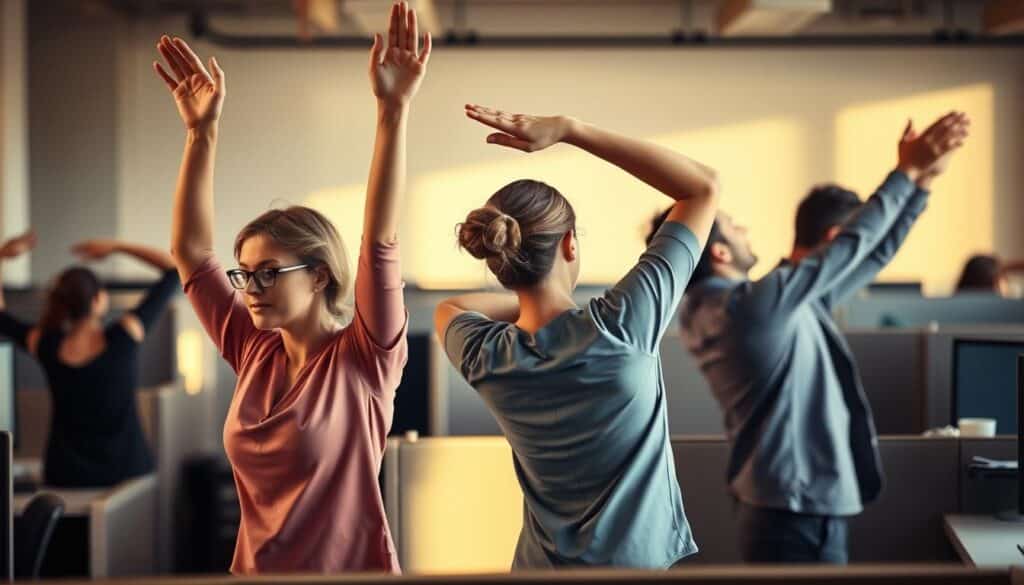Today’s work life is super busy. Finding time to stay fit seems hard. But, with covert cubicle fitness, you can fit in exercise easily. You can do simple workouts right at your desk. This way, you improve your energy, work better, and stay healthy, all while doing your job.
We’ll show you various ways to stay active at your desk. You’ll learn about stretches, chair squats, and creative uses of office furniture. This guide is for busy folks who want to mix fitness with work seamlessly.
The Importance of Staying Active at Work
Today’s fast-paced work life makes staying active tough. Knowing the dangers of sitting too much is key for everyone. Long hours of sitting can lead to health problems like obesity, diabetes, and heart disease. Adding exercise to your day can lower these risks and create a healthier work environment.
Understanding the Risks of a Sedentary Lifestyle
Sitting too long, especially over 30 to 60 minutes, can harm your health over time. Studies show that being inactive for 6 to 7 hours daily increases the chance of chronic diseases. Not moving much can also affect your mental health. It slows blood flow and brain chemicals that help fight anxiety and keep focus. Moving around releases helpful brain chemicals, making you feel better.
Benefits of Integrating Fitness into Your Workday
Adding fitness at work has great benefits. Workers who exercise feel happier, more energized, and more productive. Just standing or stretching every 20 to 30 minutes helps beat the bad effects of sitting too long. Companies that offer gym access or promote taking the stairs help improve health. Walking boosts creativity by 60% over sitting. Small changes in how we work can greatly benefit our health and how well we work.
Covert Cubicle Fitness: Discreet Exercises You Can Do
It can be tough to fit fitness into office life. But discreet exercises blend into the office, letting you stay healthy without interrupting work. Quick workouts boost energy and make you more productive.
Effective Office Exercises with Minimal Space
Many exercises for the office don’t need much space or gear. Here are a few to try:
- Desk Pushups: Place hands on your desk and perform pushups to engage your upper body.
- Seated Leg Extensions: While seated, extend your legs to tone your quads discreetly.
- Triceps Dips: Use a sturdy chair to perform dips for a quick upper body strength boost.
- Shoulder Shrugs: Lift and lower your shoulders to relieve tension and improve posture.
- Glute Squeezes: Squeeze your glutes while seated for a toning effect that no one will notice.
Quick Workouts During Breaks
Office breaks are perfect for quick workouts. They can refresh you for what’s next.
- Upright Crunches: Engage your abdominal muscles while standing or typing.
- Toe Raises: Stand and lift your heels to strengthen your calves, ideal while waiting in line.
- Swivel Chair Rotations: Rotate your chair side to side while lifting your legs to work on core stability.
- Walking Meetings: Turn stationary discussions into moving ones to integrate more steps into your day.
- Isometric Desk Presses: Press against your desk to build upper body strength without drawing attention.
These exercises are easy to mix into your day and fight the idle office life. A little change means staying fit at work is within reach.
Transforming Your Workspace for Fitness
Making your workspace movement-friendly can really boost your health and make you happier at work. Adding treadmill desks and standing desks helps a lot. They offer great ways to stay fit and keep working efficiently.
Adopting Treadmill and Standing Desks
Treadmill desks let you move while you work. If you walk at 1.0 mph, you burn about 3.5 calories per minute. That’s more than the calories burned while standing or sitting. Doctors using treadmill desks were even better at reading CAT scans.
Standing desks help you sit less. But standing too much can make you tired and sore. Mixing treadmill and standing desks could be the best way to keep fit at work.
Decluttering to Create Space for Movement
To use standing and treadmill desks well, you need a tidy space. Having room to move means you can stretch and do quick exercises. Organizing for more space helps you be more active and healthy at work. It also encourages everyone to be more health-conscious.
Quick Desk Workouts to Boost Energy
Adding quick desk workouts to your day can uplift your energy and health. You don’t need equipment, making it easy to stay active without leaving your desk. These five-minute exercises help your body and mind.
Exercises That Require No Equipment
Try these simple exercises at your workspace:
- The Silent Seat Squeeze: Squeeze your glutes for 5-10 seconds. Do it 12-15 times.
- The Wall Sit: Lean against a wall and squat until your legs are level with the ground. Stay like that for 30 seconds to a minute.
- The Desk Squat: Stand, then squat slightly and lift your arms for 15 seconds. Do 4-6 of these.
- The Pinstripe Push-Up: Lean on a wall to do 12-15 push-ups.
- Chair Calf Raises: Lift your heels while holding your desk, working your calf muscles.
- Oblique Twists: Sit still, rotate your upper body to work your abs.
Five-Minute Workouts to Revitalize Your Day
A quick five-minute workout can change your mood and sharpen your mind. Here’s how:
- Begin with calf raises for three minutes. Rise on your toes, hold, then lower.
- Then do seated leg extensions for two minutes, alternating your legs.
- Add desk planks. Put your forearms on the desk, hold for 30 seconds.
- Do shoulder shrugs. Lift your shoulders up and hold for five seconds. Repeat 15 times.
- Finish with crunches. Curl towards your legs while seated. Hold 10 seconds, do it 10 times.
These exercises aren’t just good for your posture and energy. They also lower the risk of heart disease. So, try to move or stretch whenever you can. Even short breaks are very beneficial.
Incorporating Movement in Daily Tasks
Making daily tasks active is a great way to boost fitness at work. Choosing stairs over elevators can really help improve how much we move. These small choices help workers stay active and make the workplace healthier.
Using the Stairs Instead of Elevators
Using stairs instead of elevators boosts heart health quickly. It makes your heart rate go up and strengthens your legs and core. By taking the stairs often, you can move more during your workday and become fitter.
Walking Meetings as a Fitness Strategy
Walking meetings change how we talk and help us stay fit. While walking, employees can have good talks and come up with new ideas. This keeps things interesting, makes us more productive, and keeps our energy up all day.
Stretching: Maintaining Flexibility and Reducing Pain
Stretching at work is key to staying flexible and avoiding pain from sitting too long. Sitting a lot can increase the risk of heart disease and diabetes. Stretching regularly helps reduce neck and shoulder pain and makes you more productive by helping your body relax.
The Importance of Stretching During Office Hours
It’s good to take breaks every 30-45 minutes for stretching. These short breaks, lasting 1-3 minutes, help fight the bad effects of sitting all day. Stretching boosts blood flow and works out big muscle groups like the neck, back, shoulders, hips, and glutes.
Simple Stretching Routines You Can Do at Your Desk
Adding easy stretches to your daily work can improve your posture and lessen muscle tension. Here are some stretching exercises to try:
- Rubber Neck: Gently tilt your head towards each shoulder.
- Bobblehead: Nod your head up and down and side to side.
- Look Around: Rotate your head slowly to each side.
- Reach for the Sky: Stretch your arms overhead while seated.
- Shoulder Rolls: Roll your shoulders back and forth.
- Torso Twist: Sit upright and twist side to side gently.
Keep each stretch for at least 15 seconds. Don’t do stretches that hurt. Adding exercises like Calf Raises and Chair Squats can also help by boosting coordination and focus when you’re sitting.

Doing stretches at your desk regularly helps get your body ready for physical activity outside work. It also helps prevent muscle fatigue and stiffness. Keeping desk workers flexible and pain-free is key for a healthy workplace.
Tools and Tech for Covert Fitness
Technology can greatly improve covert fitness at work. Employees use fitness gadgets to keep track of their movements. These gadgets help mix physical fitness into their daily tasks easily.
Utilizing Gadgets to Track Your Activity
Fitness gadgets like heart rate monitors and pedometers show how much you move each day. The Workout Notepad app helps track progress and set goals. It makes staying active fun at work. Trend Hunter’s database has over 489,486 ideas to stay active. Isometric exercises also build mental toughness through focus and breathing control. This helps manage stress better.
Office Tools That Facilitate Movement
Using fitness tools in the office, like resistance bands, fits well into a busy schedule. They’re great for quick workouts during breaks. This way, you get physical benefits without spending much time. A foldable resistance machine with an LCD display offers different resistance levels. It works for both arm and leg workouts. Many professionals using these tools feel more energetic and focused.
Keeping Yourself Motivated
It can be tough to keep up with fitness while working a lot. Setting clear and reachable fitness goals can help increase your motivation at work. This method helps you keep track of your success and celebrate when you achieve something.
By breaking big goals into smaller ones, you keep your motivation high. This makes it easier to stay active and meet your fitness aims.
Setting Fitness Goals and Challenges
Creating fitness goals offers a clear plan for adding more exercise to your day. Introducing fun challenges, like team workouts or personal contests, boosts team unity. For example, holding meetings while walking or doing squats during breaks fits well in most workplaces. This keeps everyone motivated and builds a healthier office culture.
Finding a Workout Buddy in the Office
Finding someone in your office to exercise with boosts commitment and fun. Coworkers can encourage each other to opt for stairs over elevators or to join stretch breaks. Working out together not only creates a strong support network but also reduces stress. This promotes better health and increases motivation at work.
Conclusion
It’s key to bring in fitness plans for the office that everyone can do on the sly. These methods aren’t just about staying in shape. They also help to boost happiness and work output.
Working fitness into our daily office life shows great results. Covert cubicle fitness turns routine tasks into chances to move around. This approach is crucial as more workplaces look to keep their teams active.
Making fitness a part of the workday pays off big time. Both companies and their staff gain a lot when these habits are part of every day. It helps improve health and shapes a better workplace culture. Over time, finding the right mix of work and wellness stops being a wish. It becomes real.



